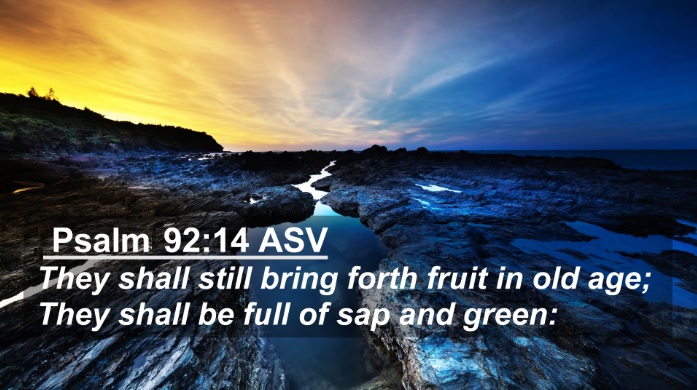“Go therefore and make disciples of all the nations…teaching them to observe all that I commanded you; and lo, I am with you always, even to the end of the age” (Matthew 28:19-20, NASB).
——————–
Contents:
1) They Will Still Yield Fruit in Old Age (Jon W. Quinn)
2) I Can Do That! (Greg Gwin)
——————–

-1-
They Will Still Yield Fruit in Old Age
Jon W. Quinn
“I don’t know… I just do not feel like I am a part of the congregation anymore.” This statement, or something very similar to it, has been made to me on more than one occasion in different churches by different brethren whom I love and respect very much. In each case, it surprised me because each had done so much to advance the cause of Christ in times past. None of them were perfect, but they each had done what they could.
So, why had this feeling developed? Well, they all had one thing in common that had led them to this conclusion. They were advanced in years. Frailties and responsibilities were weighing heavily upon them, and they were not as directly active in the efforts of the local churches where they were members as they had once been.
First, this is not a feeling exclusively found in the realm of the local church and participation in the efforts there. Even non-religious older folks many times feel the same way concerning whatever realms they may have once been more active in.
But life brings changes. God knew it would be this way, and He has something to say about it. We cannot do better than to see what the Lord has to say.
Not All of Us Are Like Moses
“Although Moses was one hundred and twenty years old when he died, his eye was not dim, nor his vigor abated” (Deuteronomy 34:7). Moses was an exception to the rule, and that is why this Biblical statement was noteworthy. We’d all like to be physically healthy as Moses was in our advanced years.
But typically, we more often fit the description of the writer of Ecclesiastes. After, in a rather mournful poetic way he described failing eyesight and losing one’s teeth, he urges us to remember always the Lord; “Remember Him before the silver cord is broken and the golden bowl is crushed, the pitcher by the well is shattered and the wheel at the cistern is crushed; then the dust will return to the earth as it was, and the spirit will return to God who gave it” (Eccl 12:6-7; see vss 1-7).
An Aged Psalmist Writes
Though we may not have Moses’ vigor, we can still have his faith. There is an interesting Psalm written by an elderly man of faith. It shows us several things about a man of strong faith as he deals with life’s issues and struggles in his advanced age. Without repeating the whole Psalm here, note a few lines from it.
First, what this gentleman does have is God as his refuge and fortress. Every man and woman of faith at whatever age always has this! “In You, O LORD, I have taken refuge; Let me never be ashamed. In Your righteousness deliver me and rescue me; Incline Your ear to me and save me. Be to me a rock of habitation to which I may continually come; You have given commandment to save me, For You are my rock and my fortress” (Psalm 71:1-3).
But this wonderful assurance does not mean that there are no ordeals to overcome. Some are related to age, some are not. For example, then as now, there are people who would trick and con the elderly. The Psalmist writes, “Rescue me, O my God, out of the hand of the wicked, Out of the grasp of the wrongdoer and ruthless man” (Psalm 71:4).
Others watch and were amazed at how this grey-headed (later in the Psalm we learn of his hair color) man of faith deals with life’s issues with a strength and grace that are his because of his faith in God. He will not stop declaring his confidence, peace and joy. “I have become a marvel to many, For You are my strong refuge. My mouth is filled with Your praise And with Your glory all day long” (Psalm 71:7-8).
After speaking of how God had been with him from birth, the Psalmist speaks of his continued need for God in the evening of life. He pleads for God’s continued presence, “Do not cast me off in the time of old age; Do not forsake me when my strength fails” (Psalm 71:9).
The Psalmist sees his advancement in age as continued opportunity to show others God’s strength, though perhaps in different circumstances than he did when he was a young man. “O God, You have taught me from my youth, And I still declare Your wondrous deeds. And even when I am old and gray, O God, do not forsake me, Until I declare Your strength to this generation, Your power to all who are to come” (Psalm 71:17-18).
And finally, the Palmist sees ultimate revival and victory in spite of the problems he faces in his final time on the earth. “You who have shown me many troubles and distresses Will revive me again, And will bring me up again from the depths of the earth. May You increase my greatness And turn to comfort me” (Psalm 71:20-21).
Some Things the Lord Has Said
The Lord urges respect for the elderly. This needs to include self-respect for those who are advanced in years. Concerning the righteous elderly, the Lord speaks of their usefulness in His service, “They will still yield fruit in old age… to declare that the LORD is upright; He is my rock, and there is no unrighteousness in Him” (See Psalm 92:12-15). For those who have lived their lives in righteous service of the Lord, the Bible says, “A gray head is a crown of glory; It is found in the way of righteousness” (Proverbs 16:31).
Services to be Rendered
So, what can one do? The first thing to remember is that in the local church there are many different things to do by different people with different abilities and opportunities. Not everyone is young or old (hopefully) but there are things for everyone to do as they are able. No one ought to feel that they are any less a part of the body due to the inability to do everything they would like to be able to do (1 Corinthians 12:13-27). So, what can an elderly disciple do who is now infirmed or otherwise incapacitated due to the restraints of age?
Be good examples. When outward strength fades, show inner, spiritual strength and let it increase. “Therefore we do not lose heart, but though our outer man is decaying, yet our inner man is being renewed day by day“ (2 Corinthians 4:16). Be the cause of others “marveling” because of your grace and inner strength and confidence. When Paul was aged, he did this from a prison (Philemon 9)!
Give counsel with Scriptures and proven experience. As you are able, speak of the blessings and victories that God has given you (Titus 2:2-4).
Pray. Anna was 84 and prayed “night and day” (Luke 2:37). Age does not diminish the effectiveness of the prayers of righteous men and women (James 5:16b). Pray for the church, the elders, the teachers, the preacher, the sick, the lost, the young, the old.
Do not let anyone diminish the importance of these three areas of service. And these are not exhaustive, you can perhaps think of many more. The church needs all these services, and those who involve themselves in these things are rendering wonderful service to God and His church and a blessing to their fellow members in the body.
— Via The Bradley Banner, Published by the Bradley Church of Christ
——————–

-2-
I Can Do That!
Greg Gwin
It’s easy to become overwhelmed at the thought of a big assignment or a difficult challenge.
Sometimes the contemplation of a long and hard task makes us weary even before we begin. In such instances it can be helpful to break the job down into smaller, ‘do-able’ segments. As these manageable ‘bites’ are accomplished, the whole project ultimately gets completed.
As we think about our obligations in service to the Lord we might feel weighed down. But, if we think in terms of the single acts of duty that we can definitely achieve, everything is soon within our reach. Add in God’s promised help (Hebrews 13:5,6) and we are well on our way to success. Like Paul, we can say: “I can do all things through Christ which strengtheneth me” (Philippians 4:13).
As we begin this new year, think of some of the things that need to be done; some of the things that you know you should be doing; and think positively about each one. Have the attitude that says: “I can do that!” For instance:
I can read my Bible every day. That’s ‘do-able’, and in the process I will become a better Bible student.
I can attend every worship service and Bible study. Taken one at a time, this will soon add up to a whole year of faithful service; a whole year of gaining strength; a whole year of encouraging my brethren; a whole year of glorifying God. Wow! That’s really worth doing!
I can talk to my friend, my neighbor, my family member, or my co-worker about my faith in Christ and the blessings it brings into my life. Who knows? That may lead to a conversion over the course of time. I can do that!
I can pray for my brethren, thinking regularly about their spiritual and physical well-being. As I do that they will be helped, and I will develop a stronger and more caring relationship with them.
There are lots of ‘little things’ that are within my grasp, and they all add up to some really good and necessary accomplishments for the Lord. All I need is an attitude that says: “I can do that!”
— Via The Beacon, January 1, 2023
——————–
The Steps That Lead to Eternal Salvation
1) Hear the gospel — for that is how faith comes (Rom. 10:17; John 20:30-31).
2) Believe in the deity of Jesus Christ, the Son of God (John 8:24; John 3:18).
3) Repent of sins. For every accountable person has sinned (Romans 3:23; Romans 3:10), which causes one to be spiritually dead (Ephesians 2:1) and separated from God (Isaiah 59:1-2; Romans 6:23). Therefore, repentance of sin is necessary (Luke 13:5; Acts 17:30). For whether the sin seems great or small, there will still be the same penalty for either (Matt. 12:36-37; 2 Cor. 5:10) — and even for a lie (Rev. 21:8).
4) Confess faith in Christ (Rom. 10:9-10; Acts 8:36-38).
5) Be baptized in water for the remission of sins (Mark 16:16; Acts 2:38; 22:16; 1 Pet. 3:21). This is the final step that puts one into Christ (Gal. 3:26-27). For from that baptism, one is then raised as a new creature (2 Cor. 5:17), having all sins forgiven and beginning a new life as a Christian (Rom. 6:3-4). For the one being baptized does so “through faith in the working of God” (Col. 2:12). In other words, believing that God will keep His word and forgive after one submits to these necessary steps. And now as a Christian, we then need to…
6) Continue in the faith by living for the Lord; for, if not, salvation can be lost (Matt. 24:13; Heb. 10:36-39; Rev. 2:10; 2 Pet. 2:20-22).
——————–
Tebeau Street
CHURCH OF CHRIST
1402 Tebeau Street, Waycross, GA 31501
Sunday: 9 a.m. Bible Classes and 10 a.m. Worship Service. We also have a Song Service at 5 p.m. for every first Sunday of the month.
Wednesday: 7 p.m. for Bible Classes
evangelist/editor: Tom Edwards (912) 281-9917
Tom@ThomasTEdwards.com
https://thomastedwards.com/go/all.htm (This is a link to the older version of the Gospel Observer website, but with bulletins going back to March 4, 1990.)

